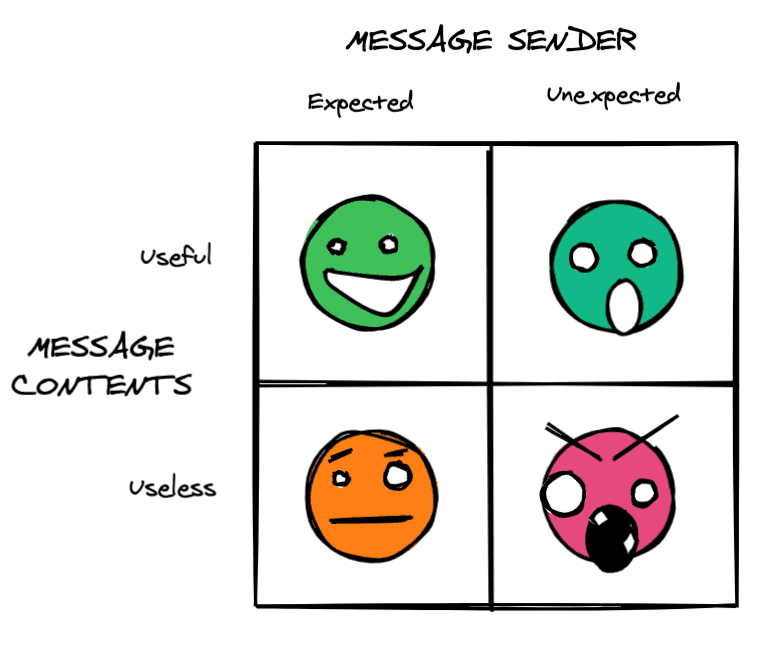community
Unexpected, Useless, and Urgent
An essay passed on by h0p3 covers the differences between online communication and tries to extract what is wonderful about RSS. This seems to vindicate Fraidycat’s strategy in distancing itself from the inbox mentality.
Onto RSS – my beautiful, dark, twisted RSS. There’s truly zero urgency here and relatively few messages (writing blog posts is time-consuming!). Moreover, returning to our message evaluation framework, an RSS inbox only contains messages from known senders, since you’ve explicitly had to add their RSS feeds to your feed-roll. And, since you’ve likely done that because you expect to value the contents of their messages, you’re likely living in the upper left quadrant in RSS-land, enjoying that drizzled honey and those weird-newspaper rolls.
What the essay doesn’t seem to explore is the possibility of giving the user tools to wrangle incoming feeds. While it certainly gives due time to the value of automated e-mail filtering.
Gmail, for example, has gotten pretty darn good at spam detection. They’re “reading your emails” and dropping the bad ones into your “spam folder” dead-letter queue. Maybe, once in a blue moon, they false-positive something that you have to go spelunking into that elephant graveyard to find. But I’m never annoyed by this, because when I see absolute garbage that they’ve blocked for me day-in and day-out, I’m hashtag grateful again.
This approach, however, isn’t possible with all mediums. There’s no way to pre-filter on content for an incoming phone-call, for example.
Spam filtering is a must with e-mail, because it’s designed to accept messages from any possible source. Have to agree with the author that the “blunt approach of dead-letter queueing” undermines the chance at great, unexpected e-mail from anyone on Earth.
RSS (and other follows) are an inversion of this: it’s literally an approved sender list, firewalled against anything else. This implies work on your part, even if only to add URLs to this list.
So why is there not more focus on giving you layers of control over this list? It needn’t just be a flat list. Of course it can be categorized, but to additionally add priorities, search terms, and filters of all stripe.
For example, you could envision following Boing Boing - but only highlight those posts that other members of your follow network are linking to.
I think I might want to read only the longer essays posted on a given blog. Or filtering for/against ‘weeknotes’ entries.
And, for sure, the ability to assign importance, so that you can still have access to less-urgent follows, but they don’t crowd you out day-to-day.
While all of this moves RSS closer to the upper-left of the above quadrant, it doesn’t eliminate the ‘unexpected’ discoveries. RSS is much more link-heavy than e-mail and text. There is no trouble expanding your followed network, because you’re exposed to new links all the time, by way of RSS.
The trouble with RSS is that it doesn’t feel like a cohesive network yet. We have some plans to improve this in Fraidycat 2. More about this in a few weeks.

This post accepts webmentions. Do you have the URL to your post?
You may also leave an anonymous comment. All comments are moderated.

